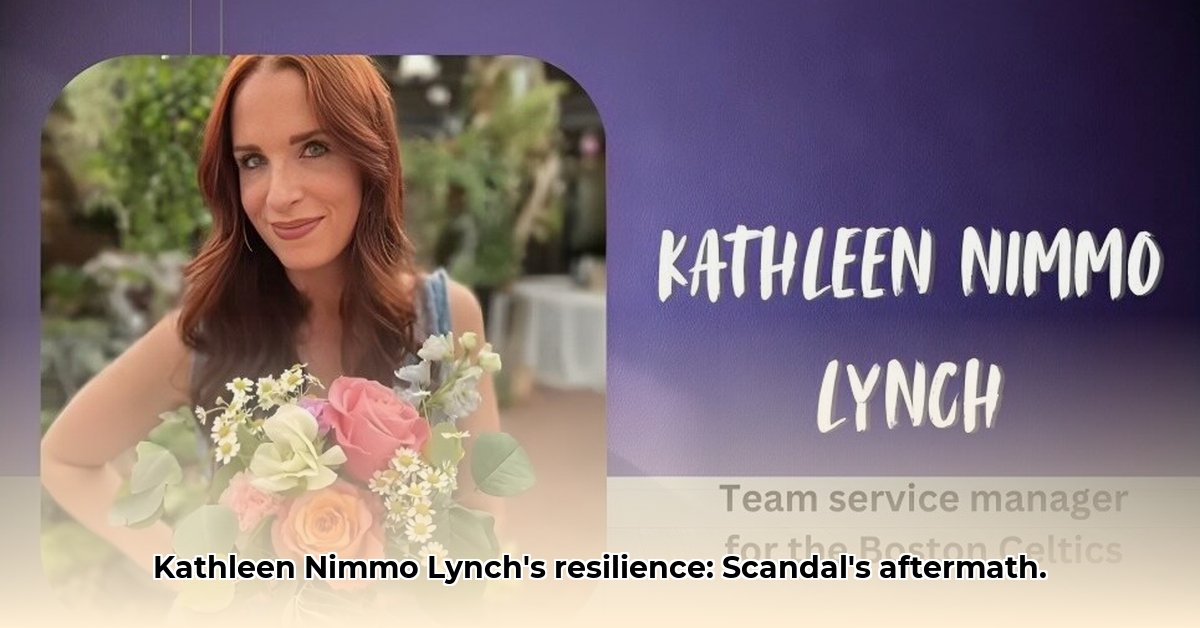
The 2022 Ime Udoka scandal sent shockwaves through the NBA, unexpectedly thrusting Kathleen Nimmo Lynch, the Boston Celtics' team services manager, into the media spotlight. While details about her personal life, and therefore her net worth, remain largely unavailable, her story underscores the remarkable resilience required to navigate the intense pressures and public scrutiny inherent in the world of professional sports. For more on high-profile individuals' financial privacy, see this resource. This article examines her career, the impact of the scandal, and the broader implications for maintaining privacy in a high-stakes environment.
A Career Built on Discretion
Kathleen Nimmo Lynch’s professional life with the Boston Celtics has primarily been characterized by behind-the-scenes dedication. Her role as team services manager involved managing numerous essential tasks crucial to the team's smooth operation – from player support to logistical arrangements – duties rarely seen in the headlines. This quiet dedication, however, ironically linked her to the Udoka controversy. The extent to which this affected her career remains unclear, although her continued employment suggests her professionalism likely mitigated any significant repercussions. How many other essential team members have similarly navigated crisis without public recognition?
Navigating Public Scrutiny: Resilience and Privacy
Despite the intense media attention following the Udoka scandal, Kathleen Nimmo Lynch has maintained a remarkable level of discretion. She has largely avoided public comment, demonstrating a commitment to protecting her privacy in the face of intense speculation. Her ability to navigate this period of intense scrutiny highlights the fortitude and skillful management of information necessary for successful crisis management, both personally and professionally. Her experience raises critical questions about the balance between public interest and the right to privacy, a particularly pertinent issue within professional sports. What strategies can be implemented to better protect individuals in similar situations?
The Privacy Paradox in Professional Sports
Lynch's experience serves as a compelling case study illustrating the inherent complexities of privacy in the digital age. The ease with which information spreads online, fueled by social media and 24/7 news cycles, creates a constant pressure. While determining her net worth remains impossible without access to her private financial records, the narrative shouldn't center around her finances, but her remarkable professionalism and discretion. This situation also underscores the crucial need for responsible media practices and the importance of safeguarding the privacy of individuals caught in the glare of public attention. How can we better define the boundaries of responsible media reporting in such sensitive situations?
Lessons Learned and Future Implications
The Udoka incident serves as a reminder of the need for improved ethical guidelines within professional sports organizations, encompassing a more comprehensive approach to employee conduct and the potential repercussions of personal relationships on organizational reputation. This includes education and training to better equip employees with the necessary tools to handle public scrutiny. Further, it demonstrates the urgent need for both responsible reporting by the media and improved measures to protect the privacy of individuals in high-profile settings. Have existing regulations failed adequately to address the unique challenges faced by individuals in similar roles?
Beyond Net Worth: A Legacy of Resilience
While the precise calculation of Kathleen Nimmo Lynch's net worth remains elusive, the narrative of her experience transcends simple financial considerations. Her quiet strength, resilience, and unwavering dedication to discretion represent a powerful testament to professional integrity. Her story highlights the importance of recognizing that true worth extends far beyond monetary value. Ultimately, this case underscores the need for fostering a more mindful and sensitive approach to privacy in the world of professional sports. What concrete steps can organizations and media outlets take to better navigate the increasingly complicated landscape of privacy and public interest?
Maintaining Privacy in High-Profile Sports: A Multifaceted Approach
The Ime Udoka controversy underscored the vulnerabilities of individuals navigating the high-pressure world of professional sports. Maintaining privacy, especially in the digital age, requires a multifaceted approach.
1. Digital Literacy and Security: Understanding and utilizing effective digital security measures is paramount. This includes carefully managing social media, understanding privacy settings, and employing robust security practices to prevent data breaches.
2. Strategic Media Engagement: Engaging with media carefully, potentially with the support of a publicist or PR team, can help prevent misinterpretations and protect against the spread of misinformation.
3. Legal Counsel: Seeking legal advice proactively can provide guidance on rights and responsibilities regarding online privacy and potential defamation claims.
4. Organizational Support: Sports organizations have a responsibility to provide resources and training on digital privacy and media relations, creating a culture that prioritizes employee well-being and privacy.
Maintaining privacy in the high-pressure landscape of professional sports is a constant challenge, but through proactive strategies and a conscious effort to navigate public scrutiny with discretion, individuals can better protect their personal lives and professional reputation. The experience of Kathleen Nimmo Lynch serves as a crucial case study for future organizational and individual strategies.